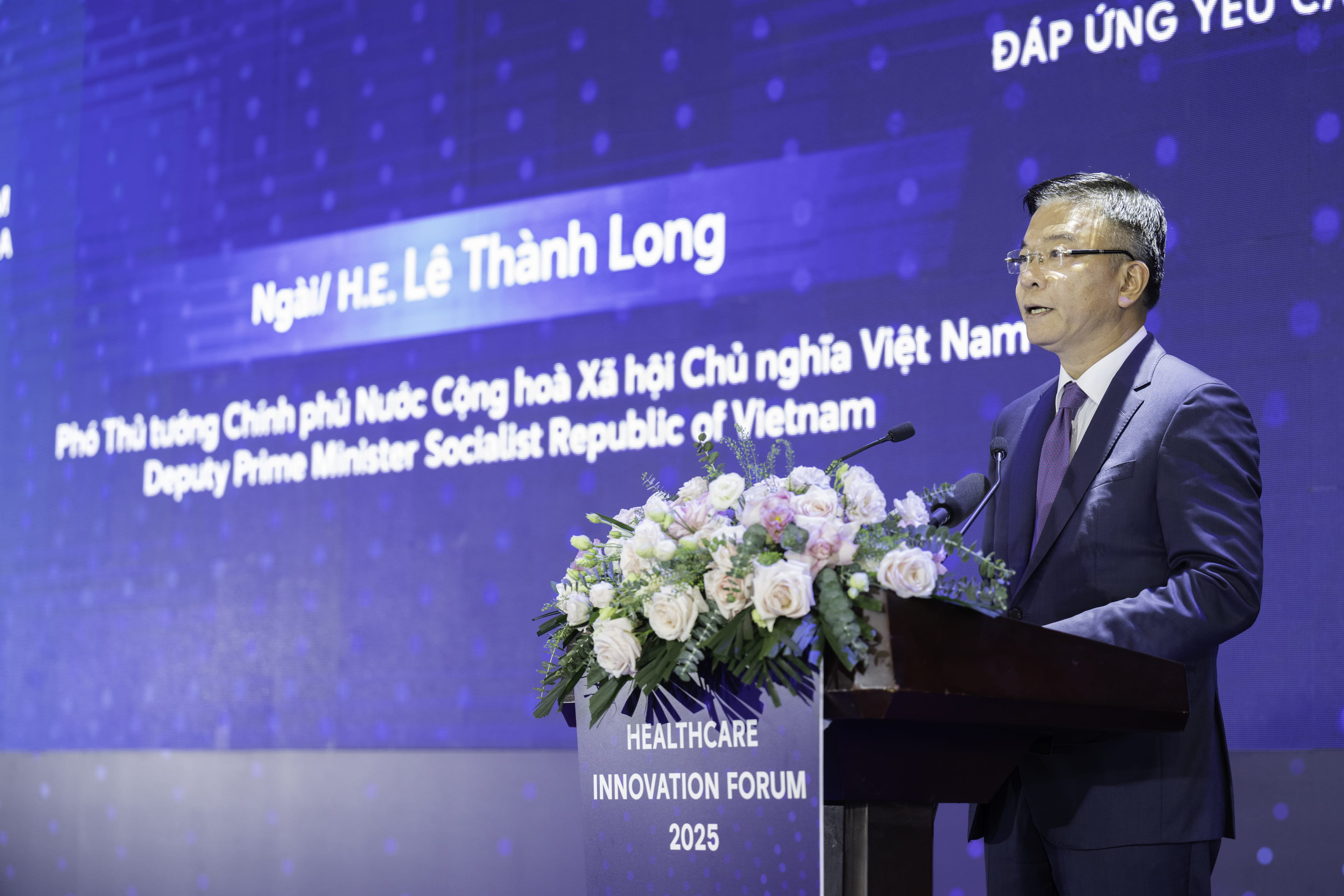FPT Proposes Public-Private Partnership Model to Develop Digital Healthcare Ecosystem
•
06/06/2025
Hanoi, June 06, 2025 – Technology corporation FPT and Pharma Group, representing the innovative pharmaceutical industry in Vietnam, co-organized the forum “Healthcare Innovation Forum – HIF 2025”.
The event served as a multi-dimensional dialogue forum between policy-makers, regulatory agencies, domestic and international experts, pharmaceutical and technology enterprises, and healthcare providers, aiming to find the most effective solutions for the healthcare of the population.
Participants in the Forum included Deputy Prime Minister Lê Thành Long of the Socialist Republic of Vietnam; Dr. Nguyễn Ngô Quang, Director of the Department of Science, Technology and Training, Ministry of Health; Hà Anh Đức, Director of the Department of Medical Examination and Treatment Management, Ministry of Health; Nguyễn Minh Lợi, Director of the Department of Medical Infrastructure and Equipment, Ministry of Health; Nguyễn Hữu Hoàng, Deputy Director, Secretariat–Editorial Division, Deputy Prime Minister’s Office; Nguyễn Cửu Đức, Deputy Director, Social Science & Culture Division, Government Office.
On the international side were His Excellency Marc E. Knapper, Ambassador Extraordinary and Plenipotentiary of the United States to Vietnam; His Excellency Thomas Gass, Ambassador Extraordinary and Plenipotentiary of the Swiss Confederation to Vietnam; His Excellency Philipp Roesler, former German Federal Minister of Health and Vice-Chancellor of Germany; Leaders of the National Health Policy Secretariat, Cabinet Office of Japan; the Clinical Trials Development Centre, Government of Singapore; and Harvard Medical School.
HIF 2025 focused on breakthrough solutions to accelerate science, technology, and innovation in priority areas of healthcare; enhance the application of Artificial Intelligence (AI); and expedite digital transformation in the field of public health.

At HIF 2025, Deputy Prime Minister Lê Thành Long said that digital transformation in healthcare is one of the five key orientations of Vietnam’s health sector.
In his address, Deputy Prime Minister Lê Thành Long stated: “Public health care is the top priority mission of the Party and the State. In the context of the Fourth Industrial Revolution and strong digital transformation, Vietnam’s health sector needs a comprehensive transformation to develop sustainably, equitably and with international integration. With that spirit, I propose five key orientations. First, vigorously promote digital health transformation, effectively deploy electronic medical records, e-prescriptions, interconnect health–insurance data, and apply new technologies such as AI, blockchain, IoT. Second, enhance scientific research capabilities, especially in biotechnology and epidemic surveillance. Third, develop the domestic pharmaceutical industry, focusing on new drug research, vaccines and medical devices. Fourth, strengthen public–private cooperation, create favourable conditions for enterprises to participate in providing high-quality healthcare services. And finally, expand international cooperation, develop modern digital health.”
Sharing at the event, Mr. Darrell Oh, Chairman of Pharma Group, affirmed: “Pharma Group – representing the innovative pharmaceutical sector – is committed to walking together with Vietnam in realizing the 2045 vision. But we cannot go alone. Only by joining hands can we turn policy aspirations into real changes, contributing to sustainable improvements in people’s health. Investing in health is investing in the nation’s most precious resource – the Vietnamese people.”

Mr. Trương Gia Bình, Chairman of the Board of Directors of FPT, proposed the public–private partnership model to develop the digital healthcare ecosystem.
At the event, Mr. Trương Gia Bình, Chairman of FPT’s Board of Directors, said: “Vietnam has chosen to step into an era of self-advancement. To realize that ambition, the health sector needs three breakthroughs: mechanisms, innovation and public–private partnership. Regarding mechanisms, we must abandon the mindset of ‘if it cannot be managed then ban it’ and shift to viewing mechanisms as national competitive strength. How can Vietnamese people access new medicines as fast as Americans or Japanese? How can we raise the access rate to new medicines from 9% up to 51% like Japan? That must be the goal of institutional reform. Regarding innovation, Vietnam can become a clinical testing and new-drug manufacturing hub based on AI. We have a million IT engineers and are heading toward 500,000 AI-skilled workforce – that is the human power. Regarding public–private collaboration, we need to connect hospitals, pharmaceutical companies, doctors and pharmacists on a shared data platform. We need to train a workforce that is both strong in IT and understands medicine. We can only join the ranks of advanced countries when we step into the most advanced industries, including pharmaceuticals.”
Application of AI in the Pharmaceutical Industry: Global Trend and Opportunity for Vietnam
According to statistics, 80% of pharmaceutical and life sciences experts currently use AI to discover drugs, and 95% of pharmaceutical companies are investing in AI capabilities. AI technology is helping drug companies shorten drug discovery processes from 5-6 years down to one year. AI applications could generate annual value of USD 350 billion to USD 410 billion for pharmaceutical companies by 2025. The use of AI in clinical trials could save up to 70% of the cost per trial and reduce execution time by 80%.
Sharing at the event, Mr. Hoàng Việt Anh, Chairman of FPT Digital and Chairman of FPT Telecom, stated: “AI and GenAI are producing positive effects for the pharmaceutical sector globally. According to reports, GenAI will contribute annually between USD 60–110 billion during 2024–2029. Every stage in the pharmaceutical supply value chain will benefit from GenAI applications. Two notable areas are new drug invention and new drug clinical trials.”
Mr. Hoàng Việt Anh also said that this is a golden moment to accelerate digital transformation and apply technology vigorously in the pharmaceutical sector, and proposed the AI application roadmap for Vietnam’s pharmaceutical industry through to 2028. Specifically, in 2025 begin building a centralized pharmaceutical database and pilot an AI lab model for new drug clinical trials in Vietnam. In 2026, pilot AI-blockchain tools to enhance the fight against counterfeit and sub-standard medicines. In 2027, aim to reduce clinical trial time for new drugs by 20%. And by 2028, Vietnam becomes an ASEAN regional AI hub for pharmaceuticals and healthcare.
Realizing Resolution 57-NQ/TW and National Health Breakthrough Goals
Vietnam is facing the challenges of a growing aging population projected to reach 25% by 2040, and 77% of deaths being caused by non-communicable diseases. The burden of disease and disparities in healthcare access across regions not only reduce quality of life but also create pressure on the health system and the national budget. Thus, the urgent need for Vietnam today is to create a modern, effective, equitable and sustainable digital health and pharmaceutical ecosystem.
In the context of Vietnam standing at a historic threshold, resolutely implementing Resolution 57-NQ/TW of the Politburo along with national goals of becoming a high-income developed nation by 2045, the health sector in particular becomes one of the key pillars to enhance quality of life, ensure social welfare, and drive sustainable economic growth. This is the golden moment when innovation and digital transformation are identified as core drivers, putting people at the centre and public health as national foundation.

At the main session of Forum HIF 2025, speakers noted that technology – especially AI and big data – is a strategic lever to achieve a leap forward in healthcare.
At the roundtable session “From Vision to Implementation – Identifying Core Critical Factors to Realize the Goals of Resolution 57-NQ/TW and National Targets on Breakthrough Healthcare”, speakers clarified the foundational factors for promoting innovation and digital transformation in healthcare.
Three key messages were emphasized: First, technology – especially AI and big data – is the strategic lever for achieving leaps in healthcare. AI not only shortens the time for new drug research and trials, but also enables personalized treatment and the development of remote care models. Second, regulatory and institutional frameworks must be radically reformed to keep pace with the speed of technology development. Speakers asserted that Vietnam can “leap-frog” if it shortens approval processes, simplifies procedures, and builds flexible legal frameworks enabling data sharing and safe exploitation of health data. Third, public–private cooperation is a critical factor. Connecting technology enterprises, hospitals, research institutes and startups will help build a sustainable innovation ecosystem.
At the roundtable, Mr. Vũ Anh Tú, Chief Technology Officer of FPT Corporation, observed: “Technology will create a leap in healthcare. AI can process huge volumes of data and thereby personalize healthcare services for each citizen. I believe there are two domains where Vietnam can act—and act fast if we leverage technology and data well. First is new drug trials – if Vietnam builds a centralized health data system and applies AI in analysis, we can become a destination for modern drug trials. This will reduce research time, cut costs, and increase patient access to new drugs. Second is developing new care models such as remote hospitals, to help solve primary healthcare challenges and expand service access.”
Mr. Tú also added: “Currently, we have Project 06 on development of population data application, digital identity and authentication serving national digital transformation, which is an important foundation for deploying smart health care programs. FPT is ready to partner the health sector, coordinate with startups, major enterprises and leading global AI research units to solve essential challenges with AI. This is how we mobilize domestic and international resources and create real breakthroughs in a new era.”




